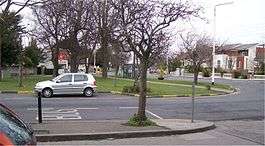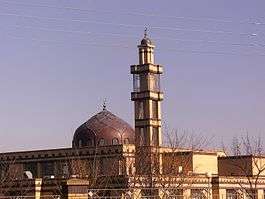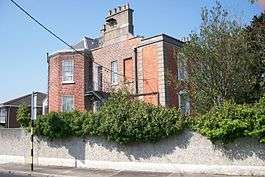Clonskeagh
| Clonskeagh Cluain Sceach | |
|---|---|
| Suburb of Dublin | |
 Clonskeagh Location in Ireland | |
| Coordinates: 53°18′30″N 6°14′25″W / 53.308333°N 6.240278°WCoordinates: 53°18′30″N 6°14′25″W / 53.308333°N 6.240278°W | |
| Country | Ireland |
| Province | Leinster |
| County | Dublin |
| Population (2011) | |
| • Urban | 11,273[1] |
| Eircode (Routing Key) | D14 |
| Area code(s) | 01 (+3531) |

Clonskeagh or Clonskea (Irish: Cluain Sceach, meaning "meadow of the whitethorn"; pronounced [klɔnskiː]), is a southern suburb of Dublin, Ireland. The district straddles the River Dodder.
Location and access
Whilst located fully within the traditional County Dublin, Clonskeagh lies partially within the administrative area of Dublin City Council but mostly in that of Dún Laoghaire–Rathdown. Roebuck Road defines the southernmost end of Clonskeagh; this area is sometimes known as Roebuck and occasionally considered to be part of Windy Arbour. Residents of Roebuck consider themselves to live in a separate area from Clonskeagh. The area is principally defined by the Clonskeagh Road and its extension into Roebuck Road, which spans its length. The northern end of the Clonskeagh Road at the junction with Eglinton Road / Milltown Road separates it from Ranelagh to the north, and the campus of University College Dublin at Belfield is to the east while Goatstown and Dundrum lie to the south. To the west is Windy Arbour, but there is no clear point at which the border might be defined.
Character and development
Clonskeagh is primarily a residential area, developed in the early decades of the 20th century. It has a small village green with a few local shops, but without a main centre. The district has changed in character as population growth in greater Dublin has imposed increasingly intensive use of land and the nearby Luas light railway has improved commuter access to central Dublin.
In the mid-1970s, Clonskeagh consisted of low-density housing with significant areas of private open land, largely owned by the Catholic Church. Since then, the closure of the Masonic Boys' School has led to commercial redevelopment north of Clonskeagh Road and former church land adjacent to Bird Avenue and Roebuck Road now has housing. Since 2000, housing development has intensified land use further by building in larger gardens, replacing houses by apartments and adding storeys to properties. This may be resisted by residents objecting to planning applications.
The Radiological Protection Institute of Ireland which was founded in 1992 is also based in Clonskeagh.
Amenities

There is a mid-20th century Catholic church on Bird Avenue, and the Islamic Cultural Centre of Ireland and primary school is on Roebuck Road.
The former Vergemount Fever Hospital at Clonskeagh is now a nursing home facility for the elderly.
There are also several green spaces, as well as a large health and fitness club, and fishing takes place on the Dodder.
Education
St. Kilians Deutsche Schule and the secondary campus of the Lycée Français d'Irlande[2] share a "Eurocampus" in Roebuck Road, offering private schooling in a multicultural and multilingual environment, claimed to be unique to Ireland.[3]
Sport
The first ever All-Ireland Senior Football Championship final was held in Beech Hill, Clonskeagh, one of the features of the area, on April 29, 1888 on the ground of St. Benburb's Football Club.
People

- Isaac Butt Q.C. M.P. who founded the Irish Home Rule Movement lived in a cottage on the junction of Wynnsward Drive and the Clonskeagh Road.
- Seán MacBride, former Irish politician and Cabinet Minister, and his mother, Maud Gonne, lived at Roebuck House, near Clonskeagh Green.
- Current Irish politicians who live in the area are; Eamon Ryan the former Minister for Communications, Energy and Natural Resources and; Mary Harney, former Minister for Health and Children and Tánaiste. Chief Baron and Judge Christopher Palles was also a resident after his retirement.
See also
References
- ↑ "Census 2011 - Preliminary results". Retrieved 16 August 2012.
- ↑ Lycée Français d'Irlande Homepage
- ↑ "Eurocampus". St. Kilians Deutsche Schule. Retrieved 2014-02-21.